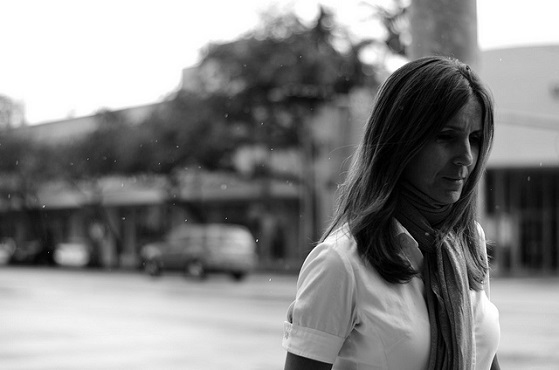Why Staying Present With Loss Is An Act Of Devotion.

{sorrow}
This was not the way I had pictured this day.
The first copy of my first book lay splayed on the kitchen table like a bruise. Dark Night of the Soul, by the sixteenth-century mystic John of the Cross: the quintessential teachings on the transformational power of radical unknowing, of sacred unraveling and holy despair. Its black and purple cover thinly shot with the possibility of dawn. My mother and sister taking turns thumbing through the pages and making appreciative comments while I paced.
I picked it up, put it back down, and resumed my post at the window.
Thirty minutes after the UPS truck had delivered my new book, the police pulled into the driveway. This was not a surprise. My daughter Jenny had been missing since the night before, when she tricked me and took off in my car. All night I rose and fell on waves of turmoil and peace, fearing she would never return, certain that all would be well.
The policeman got straight to the point. “There’s been an accident.”
“Is Jenny okay?” I grabbed his arm. He looked down at my hand.
“Your daughter has passed away, Ms. Starr.”
In a dark night of the soul (as I had explained in my little book) all the ways you have become accustomed to tasting the sacred dry up and fall away. All concepts of the Holy One evaporate. You are plunged into a darkness so impenetrable that you are convinced it will never lift. You may flail about for something — anything — to prop you up, but you grasp only emptiness.
And so, rendered reckless by despair, you let yourself fall backward into the arms of nothing.
This, according to John of the Cross, is a blessing of the highest order.
Tell that to the mother of a dead child.
With reticence at first, and then with mounting courage, I dared to mourn my child. From the very beginning, I suspected that something holy was happening, and that if I were to push it away, I would regret it for the rest of my life. There was this sense of urgency, as if turning from death meant turning from my child.
I wanted to offer Jenny the gift of my commitment to accompany her on her journey away from me, even if to do so simply meant dedicating my heartbeat and my breath to her and paying attention.
And so I showed up.
When a feeling I did not think I could survive would threaten to engulf me, I practiced turning toward it with the arms of my soul outstretched, and then my heart would unclench a little and make space for the pain.
Years of contemplative practice had taught me just enough to know better than to believe everything I think — how to shift from regretting the past and fearing the future to abiding with what is. In this case, a totally fucked up thing. The ultimate fucked up thing. I sat with that.
I did not engage in this practice to prove something to myself or anyone else. I was not interested in flexing my spiritual muscles. I did it for Jenny. My willingness to stay present through this process was an act of devotion. By leaning into the horror and yielding to the sorrow, by standing in the fire of emptiness and saying Yes to the mystery, I was honoring my child and expressing my ongoing love for her.
It was not mere mindfulness practice; it was heartfulness practice.
Our first Thanksgiving without Jenny was only a few weeks after her death, and Jeff and I were still in Hawaii. I was relieved to avoid a holiday dinner with my family. I didn’t think I would have been able to bear the empty place at the table. I was already making plans to skip Christmas.
We went out to a restaurant on the beach and ordered fish, and pretended it was any other day. But my rebellion was hollow. I couldn’t maintain the façade of apathy.
“Let’s write down everything we’re grateful for,” I abruptly suggested. You’ve got to be kidding me, my embittered self said to my hopeful self.
“Good idea.” Jeff handed me a white paper napkin. I unfolded it and drew a line down the middle with a ballpoint pen. I wrote “J” on the left-hand column and “M” on the right, as if we were about to play a game of rummy.
“You first,” I said.
“Having had the chance to be Jenny’s stepfather,” he said, and I jotted that down.
“The community that’s holding me,” I wrote.
And our gratitude came tumbling out like rolling melons from a basket. The sunset over the South Pacific. Kirtan. My mother, and Jeff’s mother, and Mother Mary. Every one of Jenny’s idiosyncrasies, from the cackling sound of her laugh to the way she would wash her money and paperclip the bills on a string to dry. I wanted to collect everything about her and weave it into the fabric of my own life.
I wanted to embody the best of Jenny — her fearlessness in the face of other people’s opinions, her joyful exuberance, and her deep quietude — and let these things make me a better human. Her legacy would live in me.
*****
Mirabai Starr is an Adjunct Professor of Philosophy and World Religions at the University of New Mexico-Taos. She is best known for her acclaimed translations of ‘Dark Night of the Soul’ and ‘The Interior Castle’, as well as ‘God of Love’ (Monkfish, 2012) and her new book, ‘Caravan of No Despair: A Memoir of Loss and Transformation‘ (Sounds True, November 2015). You could contact Mirabai via her website.

